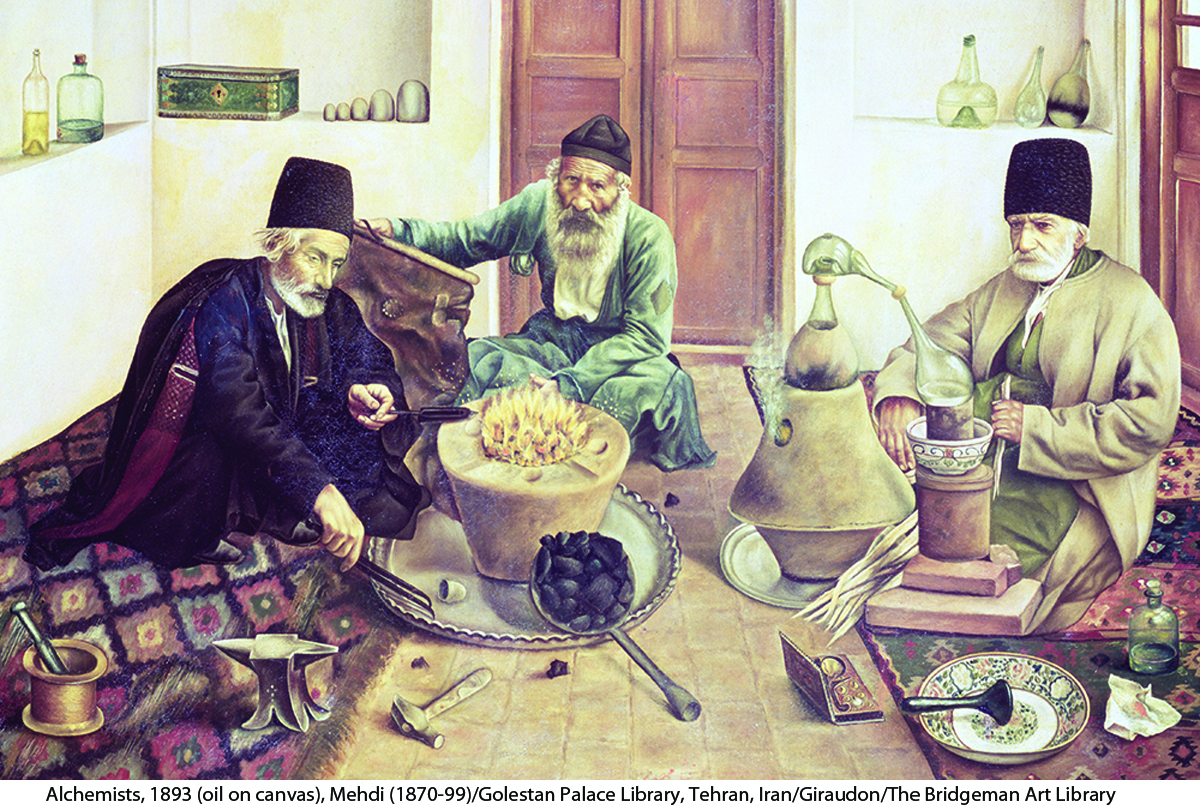LESSON 2: A Penny for Your Thoughts: Introduction to Chemistry
7
THINK ABOUT IT
HISTORY CONNECTION
HISTORY
CONNECTION
The ancient art of alchemy has been traced to many different cultures and areas around the world. Some alchemists sought to turn lead into gold or find a potion that would bring eternal life. This painting shows alchemists at work in the late 19th century.

Gold is worth a lot more than copper. If you could turn pennies into gold, you would be very rich. Beginning in ancient times, people known as alchemists tried to transform substances into other substances. In particular, some of them tried to turn ordinary metals into gold. Today, we recognize these alchemists as early chemists. In fact, the word chemistry is derived from Arabic alkīmiyā’ and from Greek khēmia, meaning “the art of transmuting metals.”
What is chemistry?
To answer this question, you will explore
The Roots of Chemistry
Chemistry: The Study of Matter and Change
The Roots of Chemistry
EXPLORING THE TOPIC
The Roots of Chemistry
CONSUMER CONNECTION
CONSUMER
CONNECTION
Why is gold so valuable? It retains its shine and resists change, even after hundreds of years. Gold is soft and easy to fashion into beautiful jewelry. It is a vital component in computers and cellular phones. Gold is also relatively rare.

While trying to make gold, alchemists developed some of the first laboratory tools and chemistry techniques. They classified substances into categories and experimented with mixing and heating different substances to create something new. When alchemists succeeded in creating a new substance, they faced the challenge of figuring out whether or not that new substance was really gold. Often, alchemists were fooled into thinking that a substance was gold just because it looked like gold.
In class, you watched a procedure to make a “golden” penny.
During the procedure, when the silver-colored penny was heated, it turned a gold color. You came up with a hypothesis to explain what happened. A hypothesis is a possible explanation for an observation. It can be tested by further investigation or experimentation. Suppose your hypothesis is that the penny turned to actual gold during the procedure. To test that hypothesis, you can compare your gold-colored penny to actual gold to see if it has all the properties, or characteristics, of gold. You can check the penny’s physical properties, such as color, hardness, weight, and the temperature at which it melts. You can also test its chemical properties, such as whether it changes when you pour acid on it or rusts over time.
Over the course of this unit, you will explore whether it is possible to turn copper or any other substance into gold. But unlike the alchemists, you will have the advantage of hundreds of years of chemistry knowledge to help you answer this question.
Chemistry: The Study of Matter and Change
Chemistry: The Study of Matter and Change
8

Changes are constantly occurring all around you. Nails rust, colors fade, milk sours, and plants grow. You can mix ingredients and bake them in an oven to make cookies. You can bleach your hair to change its color, and you can freeze water to make ice cubes. Your body can transform cheeseburgers and burritos into muscle, fat, and bone. Chemists seek to understand changes such as these.
Chemistry is the study of what substances are made of, how they behave, and how they can be transformed. It is the study of matter and how matter changes. In this first unit, you will investigate matter and how it can be changed. You will learn to describe and explain what happens when matter is changed and you will begin to understand what changes are possible.
LESSON SUMMARY
LESSON SUMMARY
What is chemistry?
KEY TERMS
hypothesis
property
chemistry
Chemistry is the study of the substances in the world around you. It is the study of matter and how matter can be changed. The modern study of chemistry emerged from the experimentation and effort of the alchemists. The alchemists invented useful tools and discovered many valuable laboratory techniques in their efforts to create gold out of ordinary substances.
Exercises
Reading Questions
How did the alchemists contribute to the modern study of chemistry?
What is chemistry?
Reason and Apply
Use the library or the Internet to research the development of alchemy in one of these regions: China, India, the Middle East, Greece, Spain, England, or Egypt. Write a two-paragraph essay on the history of alchemy for your chosen region. Be sure to list your sources. Use the library or the Internet to research common uses for sodium hydroxide, which is also called lye. Write down at least ten changes that you observe in the world around you. Which changes involve chemistry? Explain your reasoning.